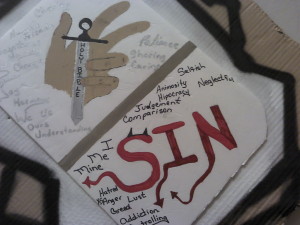Archive for April, 2015
Acts 4:32-35
32 Now the whole group of those who believed were of one heart and soul, and no one claimed private ownership of any possessions, but everything they owned was held in common. 33 With great power the apostles gave their testimony to the resurrection of the Lord Jesus, and great grace was upon them all. 34 There was not a needy person among them, for as many as owned lands or houses sold them and brought the proceeds of what was sold. 35 They laid it at the apostles’ feet, and it was distributed to each as any had need.
Just by way of introduction, this is the third time and the third church I’ve preached in on the second Sunday of Easter. Three years ago I preached on Thomas at St. Paul’s in the West End, and two years ago I preached at my home parish, Christ Church Cathedral, on Revelation.
This time, I am here, having survived the madness of Holy Week and Easter with my St. Philip’s family. We made it! It has been such a joy for me to walk the pilgrim path of Lent and Holy Week with you, and to sing my Alleluias in this grand choir of saints.
And today I’m preaching on Acts.
So here we are – ears still ringing from all those bells, lily dust hopelessly smeared on our best white blouse or jacket, hair mussed from the old Easter bonnet, but all worth it. We walked prayerfully through Lent, and came through the dramatic highs and lows of Holy Week. We earned our bells and lilies and the crumpled bits of coloured foil scattered all over the house. After forty days of careful preparation, we’re ready for fifty days of celebrating!
And we come to this passage.
At first glance, it’s inspiring but innocuous. It’s familiar, even if the main player is missing and his back-up crew is filling in. In Chapter 3 just before this passage, Peter heals a crippled beggar and everyone makes a big scene about it, and Peter dishes out the snark: “Why are you all so surprised? We told you that Jesus was the real deal and you didn’t believe, and now we’re healing in his name!†and the Apostles are thrown in jail. Yet they still manage to flummox their detractors, as Jesus did. They are stirring up trouble just the way they were taught, and they’re so good at it that they are released. The truth of Easter breaks open every cell door.
Now it starts to get really good: they pray for boldness and the place they were in “was shaken; and they were all filled with the Holy Spirit and spoke the word of God with boldness.â€
Yeah! Message received! Peter’s got a holy bug and it’s catching! Everybody’s being slain in the spirit! Easter season is really getting ramped up! What could possibly be next?
“Now the whole group of those who believed were of one heart and soul, and no one claimed private ownership of any possessions, but everything they owned was held in common.â€
Oh.
Man, this was going so well! Maybe just this once we can…you know, skip ahead? I do it all the time, don’t worry! Let’s go to verse 33 – “With great power the apostles gave their testimony to the resurrection of the Lord Jesus, and great grace was upon them all.â€
Aw yeah, Mama Church, that’s it. But…“There was not a needy person among them, for as many as owned lands or houses sold them and brought the proceeds of what was sold. They laid it at the apostles’ feet, and it was distributed to each as any had need.â€
Aw, fricassee, as an old friend used to say.
It sounds so reckless to give everything. It’s all well and good to be an idealist up until a certain age, but most of us learn quickly that things aren’t so simple as all that. A generation living off of pensions and savings while making plans to not bankrupt those they will one day leave behind knows that. A generation planning for retirement while holding investments above the water of worldwide financial collapse knows that. A generation raising families as the gaps between the super-rich and the not super-rich grow wider knows that. My generation, shackled to hundreds of thousands of dollars of debt for an education that has managed to become a requirement for every job from doctor to barista knows that.
No sensitive person makes light of the responsibilities we have to ourselves, our families and loved ones, and the system. No sensitive person berates the faithful for not being faithful enough when the faithful are still here every Sunday despite all things.
Comparing what we have with the less and the more fortunate is a game we’re usually going to lose. It makes us defensive and separates us from each other’s hearts and true needs. We may be called to outdo each other in generosity, but aren’t we also called by the Gospel to recognize that if the wisdom of our world is a vicious form of physical, mental, and spiritual competition, with winners venerated as gods and losers cast out on the dung pile, then the wisdom of the church might be to put an end to that kind of thinking among the faithful, because wasn’t Jesus himself one of the ones tossed out onto the dung pile specifically because he called that thinking into question?
This is not to set such sharing and generosity aside as something foolish that should never be considered. We should be thinking about the things we have that stand between us and God, because those things do exist. We should be laying our treasures and self-imposed burdens at the foot of the cross. We should consider what in our lives is worth living and dying for, and it’s probably not the latest iPhone.
But we’re not idiots. We know that. Despite all the panicked and technophobic newscasts and the “Kids these days†doom prophecies and the best attempts of wild-eyed advertisers, I actually do believe that most people know that.
So for now, let’s try looking at this differently. Instead of using a political lens to examine a spiritual truth, why don’t we use a spiritual lens to examine a cosmic truth – which, if we do it right, does indeed have political implications?
Imagine, if you will, a kind of poverty, stripped of all political implications, positive or negative; a poverty neither idealistically pursued nor fearfully avoided; an all-encompassing poverty not imposed by another but willingly embraced, not to make a point but to make room; a mystical inner poverty that is material, psychic, and spiritual, embraced gladly after receiving, growing, and giving birth to a great revelation.
A kenosis poverty.
The kind of poverty that comes back from the dead still bearing the scars of one sacred, dreadful, exquisite encounter with human brokenness and longing.
The kind of poverty that falls to his knees, having let go of every doubt and fear and assumption about the laws of the universe he ever had, crying, “My Lord and my God!â€
Now imagine breathing in that poverty, offered by a crucified one who returns, physically scorched from the fire of love for us.
Imagine breathing in the sweet flames of that love, shouldering the joyful, joyful weight of that love – paradoxically the easiest yoke and the heaviest burden.
Imagine the sting of that poverty, because if we, gathered here, are the Body of Christ, then the wounds belong to us – if we’re doing it right.
Remember that both Luke and John go out of their way in their Gospels not to make a lick of sense to anyone who sees life as a simple and predictable series of events. They’re kind of obnoxious that way. But they’re giving us a very powerful teaching.
Christianity is about paradox. Our greatest wealth is our poverty. Our greatest strength is our vulnerability. Our greatest armour is the wound in our side.
Christianity is about going all-in, whatever that looks like. You’re the only expert on your own life. You know already what going all-in looks like for you. If it scares you and you don’t really want to do it, think seriously about why.
Lent gives us time to contemplate the cost of what we are about to do – and the cost of not doing it.
Easter is about recklessness. It’s about going all in, because the alternative is to say that nothing has really changed.
So be warned: If you pray for boldness, you will have it – and we will all be of one heart and soul, and will give testimony with great power.
If you pray to walk in the light and to be filled with the Holy Spirit this Easter, God help you.
You will be.
Luke 24:13-49
Now on that same day two of them were going to a village called Emmaus, about seven miles from Jerusalem, 14and talking with each other about all these things that had happened. 15While they were talking and discussing, Jesus himself came near and went with them, 16but their eyes were kept from recognizing him. 17And he said to them, ‘What are you discussing with each other while you walk along?’ They stood still, looking sad. 18Then one of them, whose name was Cleopas, answered him, ‘Are you the only stranger in Jerusalem who does not know the things that have taken place there in these days?’ 19He asked them, ‘What things?’ They replied, ‘The things about Jesus of Nazareth, who was a prophet mighty in deed and word before God and all the people, 20and how our chief priests and leaders handed him over to be condemned to death and crucified him. 21But we had hoped that he was the one to redeem Israel. Yes, and besides all this, it is now the third day since these things took place. 22Moreover, some women of our group astounded us. They were at the tomb early this morning, 23and when they did not find his body there, they came back and told us that they had indeed seen a vision of angels who said that he was alive. 24Some of those who were with us went to the tomb and found it just as the women had said; but they did not see him.’ 25Then he said to them, ‘Oh, how foolish you are, and how slow of heart to believe all that the prophets have declared! 26Was it not necessary that the Messiah should suffer these things and then enter into his glory?’ 27Then beginning with Moses and all the prophets, he interpreted to them the things about himself in all the scriptures. 28 As they came near the village to which they were going, he walked ahead as if he were going on. 29But they urged him strongly, saying, ‘Stay with us, because it is almost evening and the day is now nearly over.’ So he went in to stay with them. 30When he was at the table with them, he took bread, blessed and broke it, and gave it to them. 31Then their eyes were opened, and they recognized him; and he vanished from their sight. 32They said to each other, ‘Were not our hearts burning within us while he was talking to us on the road, while he was opening the scriptures to us?’ 33That same hour they got up and returned to Jerusalem; and they found the eleven and their companions gathered together. 34They were saying, ‘The Lord has risen indeed, and he has appeared to Simon!’ 35Then they told what had happened on the road, and how he had been made known to them in the breaking of the bread.
When I received the news that my father died, I came home to discover that my husband had made a pot of tea. I know he did this because he knows I love tea and it’s a comfort…but I rather think it might also have been what I’d call an “ethnic reflex.†Both of us have English blood, you see, and that is what we do when the world collapses.
This is only a smaller version of a habit that is far more universal. When our friends found out about Dad’s death, they arrived at our door with lasagna and banana bread.
When people die, we eat. We eat as if to prod death with our life, to silently shout our ability to fill what death hollows out. We eat because it’s something we all do, and it helps us pick up the dropped stitches of one life and try to knit ourselves back together. We eat because it’s aggressively normal.
In the Gospel of Luke, Jesus spends most of his time eating. He ate with outcasts and sinners, rich and poor, healthy and broken – all of us, and every part of us, because each of us carry every category within if not without. Jesus ate with us to remind us that the great kingdom feast had come near to us and we could laugh at the paper tigers of self-imposed inequality. Jesus ate with us to remind us that all of us are linked by our mortality and our limitations, and we all need food to keep body and soul together. Jesus ate with us because it’s aggressively normalizing to eat with those whom we would rather not touch or talk to.
You could really say that this meant his whole life was shadowed by death – that every feast was funereal as well as joyful.
No wonder he was frustrated with these two poor disciples on their way home from Jerusalem, the great city of supposed redemption. They should have figured it out! No wonder it all seemed so obvious to him that he called them foolish.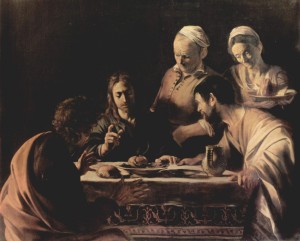
But let’s make space in our hearts for them. Let’s make much of those three very poignant and heartbreaking words: “We had hoped…†We had hoped Jesus would be the one to redeem Israel, to overturn things, to restore us to a blessedness that we could really see, to liberate us from the chains of imperial Rome. “We had hoped…â€
Don’t we all? Haven’t you ever hoped that you could rewind a conversation? Haven’t you ever hoped that a mistake was made and could be undone? Haven’t you ever hoped that your day was all a bad dream?
I’m going to suggest something that might sound a little radical. I think Jesus doesn’t quite hear this honest and very human echo of disappointment right away. Maybe that’s why he keeps going when they get to their destination.
We can cut him some slack too – he spent his morning re-arranging the truths of the cosmos.
But he’s not the only one. This might seem amazing and wonderful to us, but the best part – and maybe the scariest part – is that Jesus does not change things all by himself. That would be beautiful, but not particularly surprising. God is supposed to do ten amazing things before lunch.
What’s really astounding is that – I think – as God changes a cosmic truth, we change a Godly truth.
These two disciples – who are unnamed, because, let’s face it: they’re us – say, “Stay with us.â€
“Stay with us, because it is almost evening, and the day is nearly over.â€
Stay with us in the dark. Stay and eat. Even if it’s just the three of us, we want you here, eating with strangers, because it’s what we do when the shadows grow long and we are afraid of what comes after.
And so Jesus does – and at the end of the day, when we set out the meal for our guest, we discover that we were the treasured guests all along. We are given a gift: not just God’s presence, but God’s continued acceptance of our invitation.
A sacrament.
We are promised in this one beautiful moment, that every time we gather together and break bread in order to proclaim death is not the end of our story, God is with us, hosting this very strange meal that proclaims truth and love and eternal life.
We taste and see, and when we really see, we can’t stay in our seats. We jump up and run for miles, straight into the sunrise, without fully knowing or caring where the strength to do it even comes from.
All because we asked God to stay, because it’s getting dark.
That was all we had to do.
That’s all we have to do.
What a great scandal we Christians proclaim. How is this possible? In our records of the time, we can find mocking letters from Romans, ridiculing this ragtag group of miscreants who worshiped a god who died an embarrassing death as a convicted felon. This naked and bleeding man, who cried out “My God, my God, why have you forsaken me,†pierced and crowned with thorns, is our god? We even say this death is “good news!†Something must be terribly wrong here.
As we gaze at the cross we are not only looking at yet another chapter in the book of injustice. We are looking at the beginning of the most amazing shift in history we can imagine. We are not only looking at the unfolding of thousands of years’ worth of human history and events. We are looking at the voluntary disgracing of the source of life itself. The force that moved stars, formed earth, that breathed life into chaos before time began, is before us, having willingly given up amazing power in exchange for pain and death – all for love. This love is beautiful but also frightful in its fierceness. This love refuses to let us go in all of our destructive hatred and fear. This love says, “Show me what it is to live in the world I have given you. Give me all of your hurt and anger and pain and fear and let me experience it. I want to know you more deeply than you can know yourself. You can give me your worst and I will only accept. And after you have given me your worst, I shall gift to you my best. I shall gift to you my everything.â€
It is a most scandalous love. Mystics like Julian of Norwich, Richard Rölle, Teresa of Avila and John of the Cross wrote ecstatic volumes to its beauty and power. Everything – and nothing – can be said of this love. And we know this love not only because of the surrender to human suffering, but because of the morning that Scripture tells us awaits, the morning that undoes all death and sin and tears, if we only have faith that the sun will rise again.
Jesus was not alone on Golgotha. There were many people around him watching. While some of the people standing around made fun of Jesus, others were silent – in grief, horror, or awe.
One of these was the repentant thief, who affirmed Jesus’ innocence and asked that he be remembered when Jesus came into the kingdom. In Catholic and Eastern Orthodox tradition, this thief is given a name – Dismas or Dimas. Through reaching out to someone in pain, condemned unjustly, he received a beautiful affirmation: “Truly I tell you, today you will be with me in Paradise.â€
In the Gospel of John two more figures are placed at the foot of the cross: Jesus’ mother, Mary, and “the beloved disciple.†Jesus entrusts Mary to the care of this disciple, which was likely essential for Mary’s survival, as she likely had no one to care for her once her son was dead.
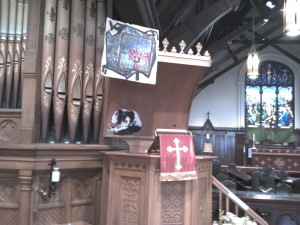 It is in the extension of one’s hand or heart that we are invited into deeper communion and relationship with the suffering beloved. In relationships God entrusts to us great responsibility. As a Jew, Jesus would have affirmed the covenant that was established between God and creation after the Flood in the Book of Genesis. Living in covenant or relationship is a great gift, and this gift should be celebrated in our lives by certain actions. Jesus sums up our half of the covenant in two commandments: “You shall love the Lord your God with all your heart, and with all your soul, and with all your mind,†and “You shall love your neighbour as yourself.â€
It is in the extension of one’s hand or heart that we are invited into deeper communion and relationship with the suffering beloved. In relationships God entrusts to us great responsibility. As a Jew, Jesus would have affirmed the covenant that was established between God and creation after the Flood in the Book of Genesis. Living in covenant or relationship is a great gift, and this gift should be celebrated in our lives by certain actions. Jesus sums up our half of the covenant in two commandments: “You shall love the Lord your God with all your heart, and with all your soul, and with all your mind,†and “You shall love your neighbour as yourself.â€
This is not a relationship that needs to be earned. Jesus does not demand a creed or confession from the thief before assuring him they will meet in Paradise. Likewise, he does not ask John to take care of Mary. He simply says, “This is your mother.†All that happened was a reaching out – by the thief in his defense of Jesus, and by the beloved disciple in remaining by Jesus’ side at the foot of the cross. The relationship is, already. We only have to reach out.
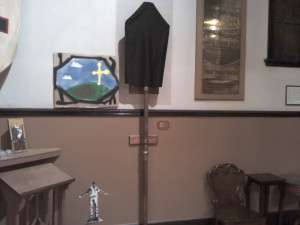 God did not try to escape any aspect of human experience. In the crucifixion of Jesus, God was accepting all of the pain of humanity at its worst.
God did not try to escape any aspect of human experience. In the crucifixion of Jesus, God was accepting all of the pain of humanity at its worst.
Crucifixion was a gruesome business. Although many people assume that death came from the nails in the wrists and feet, what really occurs is death by suffocation when the condemned is no longer able to hold his head up. It is a slow, agonizing form of execution, reserved for troublemakers, rabble-rousers, and insurrectionists. It’s easy to forget that when we wear our little gold crosses around our necks, we are essentially wearing electric chairs, or syringes filled with poison. The focus on the salvific aspects of Jesus’ death can make us lose sight of its truly shocking and scandalous nature. The Apostle Paul will not allow us to do so! He speaks of the “scandal†of the cross constantly in his letters, and marvels at God’s ability to transform such scandal into beauty and life.
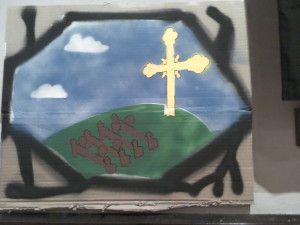
John 13:21-32
23One of his disciples—the one whom Jesus loved—was reclining next to him; 24Simon Peter therefore motioned to him to ask Jesus of whom he was speaking. 25So while reclining next to Jesus, he asked him, ‘Lord, who is it?’ 26Jesus answered, ‘It is the one to whom I give this piece of bread when I have dipped it in the dish.’ So when he had dipped the piece of bread, he gave it to Judas son of Simon Iscariot. 27After he received the piece of bread, Satan entered into him. Jesus said to him, ‘Do quickly what you are going to do.’ 28Now no one at the table knew why he said this to him. 29Some thought that, because Judas had the common purse, Jesus was telling him, ‘Buy what we need for the festival’; or, that he should give something to the poor. 30So, after receiving the piece of bread, he immediately went out. And it was night.
31 When he had gone out, Jesus said, ‘Now the Son of Man has been glorified, and God has been glorified in him. 32If God has been glorified in him, God will also glorify him in himself and will glorify him at once.
“Slowly blooms the rose within, slowly blooms the rose within.â€
Some time ago, the Anglican mystic Cynthia Bourgeault wrote a beautiful evening liturgy for one of the days in Holy Week, which included readings from the Song of Songs, the ritual anointing of our neighbours’ hands with oil (as Mary of Bethany did with Jesus’ feet in yesterday’s reading), and music including this chant. It was a moving and sensual experience that explored the mystic implications of the crucifixion.
Today’s passage reminded me of it, because, as I’ll show you, this story from John is masterfully told – even more than you might already think. The structure is so perfectly interlaced that it might be one of Marilyn’s Celtic knots…or a rose, a rich mystical symbol that suggests divine unity.
Let’s explore it together.
This story has a frame which we don’t hear in this particular passage. Think of it like the sepals, the little green leaves that give the blossom something to sit upon. These are composed of teaching; Jesus showing us how to behave, leading us by example. Here, several verses before our reading, Jesus washes feet. In the next chapter, several verses after our passage, he begins a discourse, which goes on for several more chapters. Scholars call it the Farewell Discourse. I call it, “Goodbye, I love you.â€
Both of these actions are also about death. There are clues in John that show us this. Jesus’ feet have been anointed by Mary of Bethany, and Satan has “put it into the heart of Judas†to betray Jesus. The forces to begin the ending are already in motion. So Jesus takes off his cloak. That’s a bad translation. He lays down his cloak – as he will later lay down his life.
He does this purposefully, with complete control. Not for John’s Jesus the desolate cry from the cross, “My God, my God, why have you forsaken me?†John’s Jesus says only, “It is finished.†He is in control.
Likewise, the Farewell Discourse – “Goodbye, I love you†– is a last will and testament.
The sepals teach us that the Christian life is constantly shadowed by kenosis – pouring out in order to be filled.
Now we’ve come to the next layer. This is the layer we would rather not think about, the one that keeps us up at night. These are the shadows between the petals.
The first shadow is Judas. After the washing of those precious feet, we have a heart hosting Satan. The lectionary we use is unfair to Judas, because we hear today’s story before we hear the foot-washing story, which we don’t hear until tomorrow. This, I think, tries to avoid the fact that Judas also had his feet washed. The foot-washing happens before Judas leaves.
How does that make you feel?
Personally, it takes my breath away.
And yet, still, with clean feet, Judas scuttles out – having been commanded by Jesus to do so.
Like Judas, we all have these shadows. As much as we’d like to pretend it is otherwise, we have them. We don’t have to scour our minds thinking about who we betrayed. It is just as easy, and probably far more common, to discover that we have betrayed ourselves. Do not despair. It’s our story. There’s no use crying over a bitten apple.
The second shadow is Peter. As usual he impulsively blurts out his commitment to stand by his love to the end, and of course, Jesus bursts his bubble, also as usual.
Once again, this is our story – if not to someone else, then to ourselves.
This too is our shadow, our darkness.
But what does the Gospel of John say about darkness?
Now we come to the petals, and peeling them back come to the very centre, the very heart, of the Christian life.
I’ll show you three petals.
First petal: A magic Johannine phrase (ring your bells – no, hammer them): And it was night.
Sounds like shadows again. Ah, but we’re not finished.
Second petal: Jesus says, “Now the Son of Man has been glorified.â€
Now? After the worst part of this story?
That’s why we call it the Mystery of Faith.
And we’re still not finished.
Third petal: “I give you a new commandment: to love one another.â€
Beautiful. Can’t we just end there? But remember: this is all layered with shadows. After the command to love, there is the whole-hearted intention to abide by that commandment: “Lord, I will lay down my life for you!†And then, of course, that harrowing truth of denial.
But shadows do not negate petals. They have no power over the existence of this plant, its scent, its colour, or its beauty.
They are a part of what makes it beautiful.
The light is shining in the darkness, and the darkness does not overcome it.
And that is not just a truth of God. It is a truth of the human heart: a fragile piece of flesh imprisoned within a cage of ribs, beating – and loving – in utter darkness, hidden but not negated by our precious flesh.
This Holy Week, stare down the darkness of the world reflected in this story, and sing with me.
“Slowly blooms the rose within, slowly blooms the rose within.â€
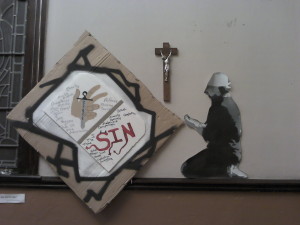 We all carry crosses of pain with us every day of our lives. Our hope and comfort is that Jesus also carried a cross of pain – not just his own but every cross there has ever been. There’s often a focus on Jesus carrying our sins, but it wasn’t just sin. It was despair, hatred, fear, and giving up. It was the starving Jewish child in the city behind him, the people of Europe ravaged by the Black Death fifteen hundred years later, African slaves, First Nations people in residential schools, German Jews in the gas chambers, the sobbing North American teen contemplating ending his life – even poisoned rivers and dying polar bears, victims of human greed and fear.
We all carry crosses of pain with us every day of our lives. Our hope and comfort is that Jesus also carried a cross of pain – not just his own but every cross there has ever been. There’s often a focus on Jesus carrying our sins, but it wasn’t just sin. It was despair, hatred, fear, and giving up. It was the starving Jewish child in the city behind him, the people of Europe ravaged by the Black Death fifteen hundred years later, African slaves, First Nations people in residential schools, German Jews in the gas chambers, the sobbing North American teen contemplating ending his life – even poisoned rivers and dying polar bears, victims of human greed and fear.
Jesus took it all and carried it for all of us – the whole family of the planet earth – willingly. He could easily have used the awesome power that he had used while walking on the water, or stilling the storm…but he did not. God invited God’s self into human existence and drained the cup dry. Christians proclaim that they too are called to carry the cross of the world’s pain and suffering.
Here’s the really amazing part: Jesus actually needed help with this cross. This is a beautiful moment in the passion narrative. Jesus is not Superman. He lays aside his sovereignty in these moments. God is dependent on us in this time and reaches out. There is never a moment when we are not being invited into deeper relationship. God willingly reaches out and says, “Help me. Teach me how to close the gap between you and me.†In this way, Jesus is like a lover. In this period of Lent we can ask ourselves where we are being invited into deeper relationship with God through helping others, the faces of Christ.